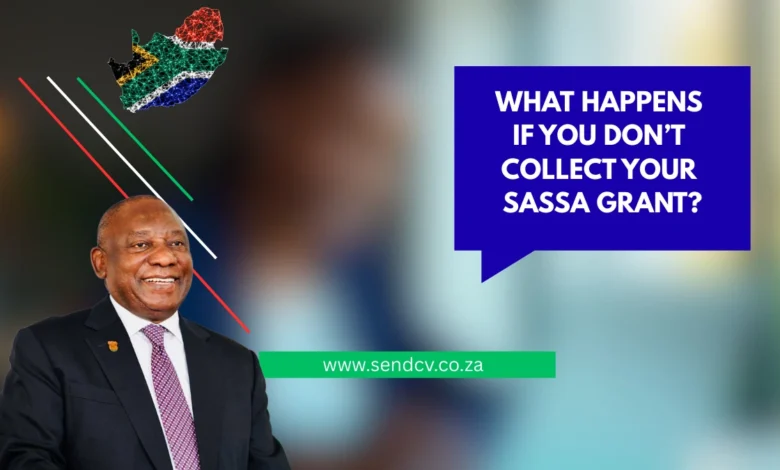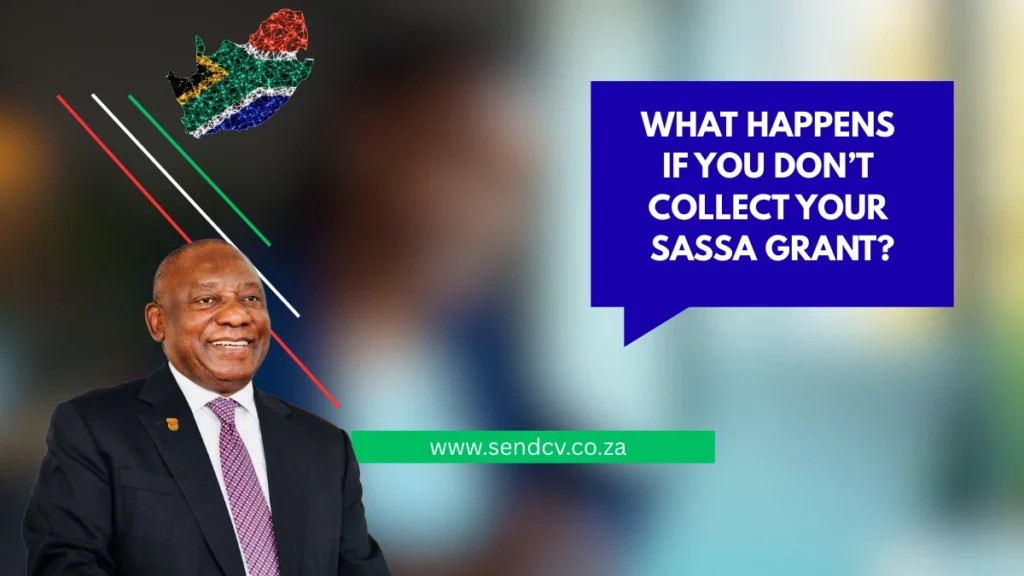What Happens if You Don’t Collect Your SASSA Grant?

A Complete Guide for Beneficiaries in South Africa
Introduction: Why This Question Matters
For millions of South Africans, the South African Social Security Agency (SASSA) grants are a lifeline. These monthly payments help beneficiaries cover essentials such as food, school fees, transport, and healthcare. But what happens if you miss collecting your grant?
What Happens if You Don’t Collect Your SASSA Grant? This guide provides a clear explanation of SASSA’s rules, timelines, and procedures when grants are not collected. It also offers practical advice on what to do if payments are delayed or not received, ensuring beneficiaries know their rights and responsibilities.
Understanding the Basics of SASSA Grants
SASSA grants are monthly financial support payments funded by the South African government. They are distributed to qualifying citizens to reduce poverty and support vulnerable groups.
The most common grants include:
- Child Support Grant
- Older Persons Grant (Pension)
- Disability Grant
- Foster Child Grant
- Care Dependency Grant
- War Veterans Grant
- Grant-in-Aid
These payments can be collected through various channels, such as direct deposit into a bank account, SASSA Gold Card withdrawals at ATMs and retailers, or cash collection points.
The Rule: What Happens If You Don’t Collect Your SASSA Grant
SASSA’s policy is clear:
- If you do not collect your grant for three consecutive months, your grant will be suspended.
- Suspension does not mean permanent cancellation, but you will need to reapply or submit a request for reinstatement to access payments again.
This rule is in place to ensure funds are allocated only to active and eligible beneficiaries.
Why Grants Are Suspended After Three Months
There are several reasons behind the three-month rule:
- Fraud prevention – Ensuring grants are not being misused by individuals who no longer qualify.
- Accurate record keeping – Removing inactive accounts helps SASSA manage resources effectively.
- Encouraging timely collections – Grants are intended for immediate household needs, not long-term accumulation.
What to Do if Your Grant is Suspended
If your grant has been suspended because you did not collect it for three months, you have options.
Step 1: Visit Your Nearest SASSA Office
Explain your situation to a SASSA officer. They will verify your details and explain whether you need to submit a reinstatement request or a new application.
Step 2: Provide Supporting Documents
You may need to present:
- Your original South African ID
- Proof of residence
- Banking details (if using direct deposit)
- Any documents showing why you could not collect the grant (e.g., hospital records if you were ill)
Step 3: Request Reinstatement or Reapply
- Reinstatement: If your grant was stopped due to non-collection only, you can request reinstatement.
- New Application: If your circumstances have changed, you may be required to apply again.
What If SASSA Fails to Pay You?
There may be cases where you collected your grant regularly but SASSA fails to pay what is owed. This could happen due to system errors, banking issues, or administrative delays.
In such cases:
- Lodge a formal complaint at your local SASSA office.
- If unresolved, escalate the issue to the Head of the Regional SASSA Office in your province.
- Keep a written record of your complaint with dates and reference numbers.

How to Lodge a Complaint with SASSA
When payments are missed, it’s important to follow the official complaint process.
Steps for Lodging a Complaint:
- Go to your nearest SASSA office and explain the issue.
- Request to fill out a complaint form.
- Attach any supporting evidence (bank statements, reference numbers).
- If not resolved at office level, escalate to the Regional SASSA Head Office.
- For unresolved disputes, you may also contact the National Department of Social Development.
Situations That May Lead to Non-Collection
There are many reasons a beneficiary might miss collecting their grant:
- Illness or hospitalization
- Travel or relocation
- Lost or stolen SASSA card
- Banking issues (wrong details, closed accounts)
- Lack of access to collection points in rural areas
Understanding these challenges helps SASSA officials process reinstatements fairly.
How to Prevent Your Grant from Being Suspended
Beneficiaries can take proactive steps to avoid suspension due to non-collection.
Practical Tips:
- Collect on time: Try to withdraw or use your funds within the same month.
- Switch to direct deposit: Link your grant to a bank account for automatic payment.
- Update details: Ensure your contact and banking details are correct at SASSA.
- Appoint a procurator: If you are elderly or disabled, you can authorize someone you trust to collect your grant on your behalf.
How Reinstatement Works
If your grant has been suspended, reinstatement is possible.
Key Points:
- You must visit a SASSA office in person.
- You need to provide your ID and reasons for non-collection.
- Processing times may vary, but once approved, you may receive back payments for the months you missed.
Frequently Asked Questions
1. Will I lose my grant permanently if I don’t collect it?
No. Your grant will be suspended after three months of non-collection. You can request reinstatement or reapply.
2. Can someone collect my grant on my behalf?
Yes. You can nominate a trusted person (known as a procurator) by completing the relevant SASSA forms.
3. What happens to the money if I don’t collect it?
Uncollected funds are returned to the state after the suspension period. They are not held indefinitely.
4. How long does reinstatement take?
It depends on the complexity of your case, but typically it takes between 30 and 90 days.
5. Do I need to reapply every year?
No. Grants are continuous but may be reviewed by SASSA periodically to check eligibility.
Quick Visual Guide: SASSA Grant Collection Rules
| Action | Outcome |
|---|---|
| Collect grant monthly | Payment continues as normal |
| Do not collect for 1 month | Grant remains active |
| Do not collect for 2 months | Grant remains active but flagged |
| Do not collect for 3 months | Grant is suspended |
| Lodge complaint if unpaid | Escalate to regional SASSA head office |
Rights of Beneficiaries
Every SASSA beneficiary has rights, including:
- The right to fair treatment and equal access.
- The right to lodge complaints and appeals.
- The right to appoint a proxy for collection if unable to attend in person.
- The right to information and transparency from SASSA offices.
Knowing your rights helps ensure that you are not unfairly excluded from the system.
The Bigger Picture: Why SASSA Rules Are Important
While it may seem inconvenient, SASSA’s rules on grant collection help to:
- Prevent fraud and identity theft.
- Ensure resources reach genuine beneficiaries.
- Keep the system accountable and efficient.
By enforcing collection deadlines and requiring updates, SASSA maintains trust in the system and ensures sustainability of social support in South Africa.
Conclusion: Stay Informed and Protect Your Grant
Not collecting your SASSA grant for three consecutive months will result in suspension, but reinstatement is possible. The key is to stay informed, collect regularly, and update your details when necessary.
If SASSA fails to pay you, you have the right to lodge a complaint, first at your local office and, if needed, to the regional head office. By knowing the rules, beneficiaries can protect their income and continue to benefit from this essential form of social support.
The SASSA grant system is designed to support vulnerable individuals and families. By following the correct procedures and staying engaged, you can make sure your grant continues to serve its purpose: helping you and your household meet life’s daily needs.
Important Notice
SENDCV is a registered Non-Profit Organisation (NPO Registration No: 2023 / 873760 / 07) and a Public Benefit Organisation (PBO: 9107665276).
We want to assure you that we never ask for money or collect CVs in exchange for jobs. If you come across anyone claiming otherwise, it’s not us.
Please stay alert to fake job ads and recruitment scams. Your safety matters to us.
👉 For tips on how to protect yourself, visit our Fraud / Scam Alert Page.





